Progressing toward a Report Card for the Gulf of Mexico
Heath Kelsey · 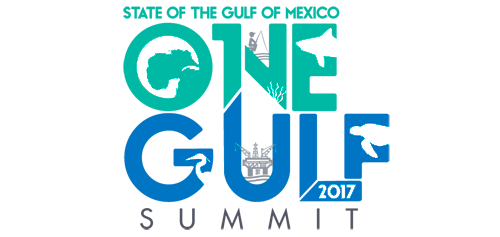
The theme of the State of the Gulf of Mexico Summit this year in Houston was “One Gulf” and was all about synthesis of science to create positive restoration outcomes. I served on a panel with Mark Harwell and Jack Gentile to discuss our work on the Texas coast Report Card project, and our larger ambition for a Gulf of Mexico Report Card. Given the emphasis on the need for synthesis expressed throughout the meeting, the timing couldn’t have been better.
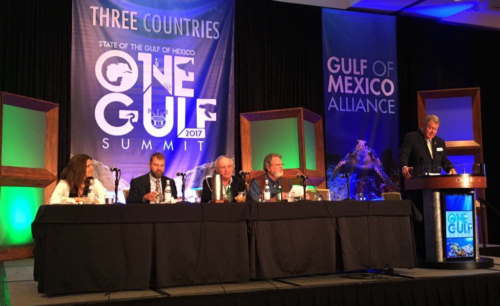
The sessions leading up to the panel discussion all talked about the need for integrating science to create positive action. Don Boesch, in his own presentation and in comments to others repeatedly touched on the “So what?” question: What does all of this mean for the Gulf of Mexico, and how can we use this information to make better decisions? He was not alone: I sensed a growing consensus among participants that we already know what the problems are, and that the current need is not additional research, but an ability to apply our knowledge to change the trajectory of the Gulf ecosystems for the benefit of people and nature.
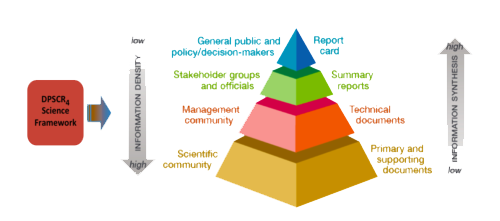
Key to achieving this is an ability to track our progress, for which a report card is an invaluable tool. In our panel discussion, Mark and Jack started our talk describing the scientific basis for the report card, and I finished with a discussion on how the report cards work and the positive outcomes from these projects. I got a lot of great feedback after the session - the prospect of creating a report card seems to resonate with people, and I think the mood is right to advance the effort in a high-profile way. Another positive aspect of the meeting was an emphasis on including Cuba in the discussions; it was clear that we need to include Cuba in the report card projects in the Gulf.
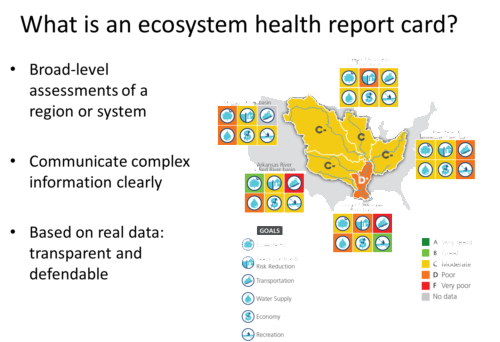
It was also great to catch up with colleagues I had worked with in other ongoing report card projects, specifically on report cards in Mexico. Bill and I met Dr. Porfirio Alvarez through the Texas Coast Report Card project in 2015, and Porfirio and I kicked off the idea of a Southern Gulf of Mexico Report Card in Tabasco in April 2016. Subsequently, Jane Hawkey and I began the Yucatán report card with a workshop in Sisal in August 2016, where we met Nuno Simoes, who was also at the Gulf Summit this year. Immediately following the Summit this year, Nuno attended a meeting in Baja to discuss an additional potential report card project for the marine waters of the Mexican Gulf. It was great to catch up with both of them (and others) as they continue to carry the torch for report cards in the Gulf of Mexico.
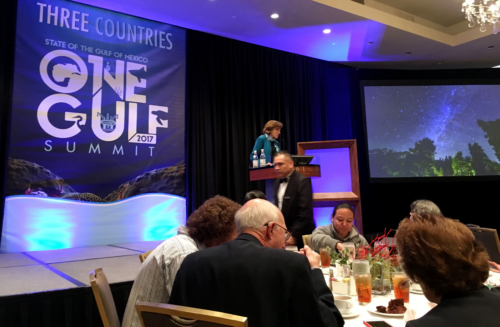
Other highlights of the meeting for me included inspiring talks from Sylvia Earle, and our own Don Boesch, and a presentation including a Conceptual Diagram in the IAN style. I never left the hotel; the meeting had all I needed.
About the author
Heath Kelsey
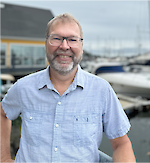
Heath Kelsey has been with IAN since 2009, as a Science Integrator, Program Manager, and as Director since 2019. His work focuses on helping communities become more engaged in socio-environmental decision making. He has over 10-years of experience in stakeholder engagement, environmental and public health assessment, indicator development, and science communication. He has led numerous ecosystem health and socio-environmental health report card projects globally, in Australia, India, the South Pacific, Africa, and throughout the US. Dr. Kelsey received his MSPH (2000) and PhD (2006) from The University of South Carolina Arnold School of Public Health. He is a graduate of St Mary’s College of Maryland (1988). He was also a Peace Corps Volunteer in Papua New Guinea from 1995-1998.

